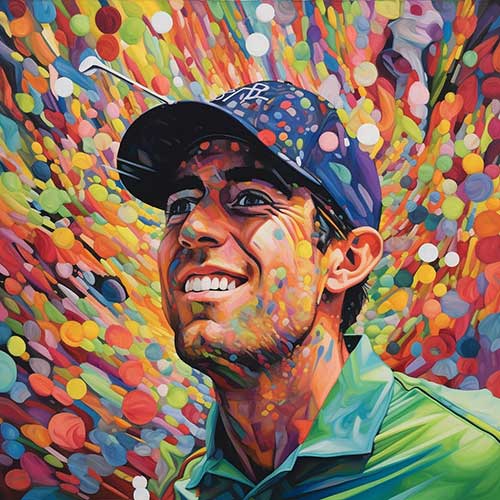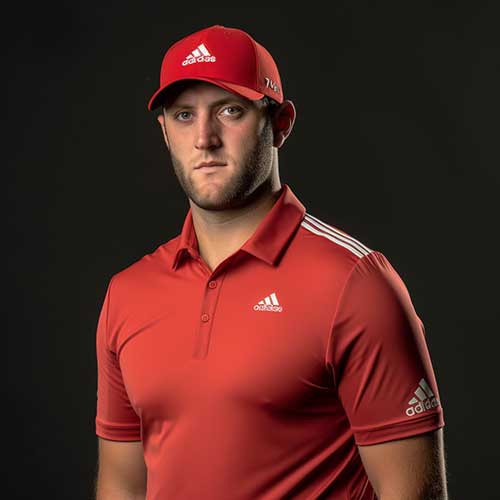
Different Ways to Bet on Golf
If you're new to golf betting or just ready to try some new types of bets, this article is for you. Today, we'll look at the following golf bets in detail.

Downtown Ricky Brown
July 19, 2024
Table of Contents
- To Win
- Each Way
- Versus the Field
- Head-to-Head Matchups
- Group Matchups
- Round Leaders
- Parlays
- Futures
- Live / In-Game Betting
- Make / Miss Cut
- Prop Bets
If the above options sound confusing, don't worry! Let's break them down into simple parts.
#1 To Win Outright - Golf Bet
An outright bet picks a tournament winner. This is the most straightforward kind of bet and also the most popular. But just because sheep like this bet doesn't mean the sharps don't play it as well.
If you place a "to win" bet and your player wins, you win the bet. Easy right?
One good thing about betting on the tournament winner in golf is that you'll always get decent odds, even when picking favorites. That's because there is such a large field of great golfers competing.
To illustrate this, compare picking the winner of a golf tournament to a horse race or a Formula 1 event. There is a big difference between these sports because most horse races only have 12 entries. Even the Kentucky Derby maxes out at 20 horses racing — which happens to be the same number of cars in a Formula 1 event.
So you have a 1-in-20 chance of picking a winner straight up. However, on the PGA tour, you've got over 100 players competing for first place. Thus, it's much easier to predict a Max Verstappen win when he's starting at pole position in a field of 20 Formula-1 cars than to predict a Rory McIlroy win going up against 144 players in a pro golf tournament.
The sportsbooks know it's harder to pick a winner in golf. Therefore, they must offer more favorable odds on a "To Win Outright" bet to entice bettors to take the chance. You can get good odds on this bet even when picking favorites.
Betting Longshots vs. Favorites in Golf
But remember this—while To Win bets offer good odds on favorites. Betting on long shots To Win offers HUGE payouts. A friend from my junior golf days won $30,000 on a longshot To Win bet. And he only bet like $300. That won't happen often, so he doesn't go crazy making longshot bets. But when he hits, he hits.
Point being when making To-Win bets, you don't always have to play it safe with favorites. Other factors, like the course conditions or the LIV tour poaching some of the top players, could favor a longshot coming out of nowhere to win a PGA event.

#2 Each Way - Golf Bet
If you bet on horse racing, then you already understand this bet. If not, an "Each Way" bet is two bets wrapped in one. One part of the bet gives you odds on a player to win, and the other gives you different odds for the same player to place. To "place" means finishing in the top 3 or 5, depending on what your sportsbook offers.
The good news is that you can get some good odds with an Each Way bet, and your player doesn't have to win outright for you to profit.
But, if your sportsbook doesn't offer the Each Way option, you can place two bets: One bet, "To Win," and a separate bet on the player, "To Place," in the top 3, top 5, or whatever is available.
#3 Versus The Field - Golf Betting
A "Versus The Field" bet allows you to bet the field against a specific player. With this bet, you root for everyone else to beat the player you want to lose. For example, you might see this bet offered in the later rounds of a tournament when one golfer has a sizable lead.
The sportsbook could allow you to bet against the leader in this situation. And as long as anyone else wins, so do you!
Let's take Rory McIlroy as an example. Let's say he has a five-shot lead going into the last round. However, you believe that his dogmatic approach to a putting routine has affected his ability to make short putts in clutch situations. So, you could take a "Versus-the-Field" bet where you wager that Rory won't hold onto his lead. You would be betting on the field against him.
In this case, it doesn't matter which player wins as long as Rory loses. That's how Versus the Field works.
#4 Head to Head Match Ups
A head-to-head bet is where the sportsbook sets a line between two golfers. The rest of the field becomes irrelevant in this situation. The only result that matters is between the two players going head to head. We'll use Rory McIlroy as an example again.
Let's say the sportsbook sets a line between him and Jordan Spieth. This bet could cover one round, the entire tournament, or the remainder.
Okay? So, it doesn't matter where these players finish in the pack. They could finish dead last and next to last. All that matters is which player beats the other.

Another thing about matchups is that if the players going head-to-head are in different groups, you should check the weather report because two players with different tee times could face different course conditions. For example, the early morning player could have the weather advantage if the wind picks up in the afternoon.
This won't be an issue betting on the LIV tour because the players are teeing off simultaneously. Nonetheless, if you're an expert on a particular player and know his game well, you might have a good idea when he's on a roll and likely to win head-to-head.
The last thing about this type of bet is some sports books are turning head-to-head golf matchups into multiway markets. So, in our example, instead of betting on either McIlroy or Spieth to beat each other, you could also take a third option on a bet to tie.
On the surface, this sounds cool, having another option. However, in a standard matchup, a tie results in a push. In a multiway bet, however, a tie counts as a win for the sportsbook. So, multiway becomes another way for you to lose. Something to think about.
#5 Group Matchups
Similar to head-to-head matchup bets, some sportsbooks also offer group matchups. This type of group bet can consist of 3 or more players. So, why would you bet on a group matchup vs. a two-player matchup? Better odds.
Let's say you have a group matchup of five golfers. You'll see the favorite offered at much better odds than a two-player matchup.
Once again, a chance to win more money means picking a winner will take more work. You have a 50% chance of winning in a matchup between two golfers with a dart throw. A group matchup of five golfers reduces your chances to 20%. So, picking a winner in a head-to-head matchup will be easier than picking the winner in a group bet.
Whether it's a group matchup or a head-to-head, I prefer matchups because they limit the options. If picking one winner from a group of 48 players in a LIV event or over a hundred entrants in a PGA tournament requires too much luck, matchups might be the play for you.
#6 Round Leaders in Golf Betting
Another way to bet is to pick who the leader will be at the end of a particular round. Now, this can sound like a pure luck bet at first glance. However, if you check player data, some golfers historically get off to a good start. They may never win but are frequently the fastest horse out of the gate. These players might be worth a bet to lead the first round in specific tournaments.
#7 Parlay Bets
When I first got started in sports betting, parlay bets sounded complicated. However, a parlay bet is when you wager on multiple outcomes. The critical thing to remember about parlay bets is that you must win all the results selected to cash out.
For example, you could parlay $100 on Cameron Smith to beat Brooks Koepka and Bryson DeChambeau to beat Phil Mickelson on a LIV tour event. To get paid, though, it doesn't help if Cameron Smith wins but DeChambeau loses. Smith and DeChambeau would both need to win for you to win your Parlay.
If you like two or more bets equally and would place them individually anyway, why not make it a parlay bet if the odds are better? That sounds good in theory, but remember that if you place two regular bets and lose one, you'll still come close to breaking even - win one, lose one, minus "the juice." But if you lose one bet in a parlay, you've lost it all.
#8 Futures Bets in Golf
People hear "futures" and immediately think of a complex commodity trade. Forget all that. Think of futures in sports betting as a longer-term bet extending into the future.
These bets can be made at the beginning of the season or even later. The only difference you'll see in the different time frames is the payout odds available.
For example, let's say you like Jon Rahm and think he's a solid bet to win the Masters. You might get better odds at the beginning of the season with the tournament so far away, because the bettor who waits until a week out to place a futures bet on Rahm will get worse odds if he's playing well before the Masters.
However, if Jon Rahm has a terrible season leading up to the Masters, the odds will be more favorable. And if you still want to pick him to win, it would have been better to wait for better odds. Lots can happen in futures.

Golfers' games face high variance, and predicting how they'll play a long time in advance is difficult. But the good thing about futures in golf is that with so many tournaments, you don't have to wait an entire season to cash out. You can place your bet just before the tournament starts; you'll know if you won by Sunday.
#9 Live / In-Game Golf Betting
Those new to golf betting often think their options are limited to placing bets before a tournament starts. But some sportsbooks will offer the chance to place bets "live" while play is underway.
In this situation, the odds are dynamic and based on real-time action. If you're an intuitive bettor and get good vibes while watching live action, in-game betting could work for you.
#10 Make / Miss the Cut
If you tap into a player's personal life on social media, you may gain some insight into outside stressors that can negatively impact their play in the short term.
For example, a newborn baby can cause sleepless nights. A divorce or other family issue can cause stressors. Changing caddies or teachers can go either way. Also, remember that winning a big tournament can cause a hangover the following week. The player may want to relax, enjoy their victory, and take some time off, but they're previously committed to playing the next week. In such cases they have to play but their heart may not be in it.
#11 Prop Bets
Prop bets are an entertaining collection of bets you can make that aren't usually connected to the tournament's outcome. An example of a prop bet might be something like:
Will there be any aces in the final round of the tournament? Or will there be a playoff for first place? The most crucial distinction when considering prop bets is that some are skill bets while others are straight-up gambling.
Let's take predicting aces, for example. Regardless of how well a player flags his irons, making a hole-in-one still requires a lot of luck.
Let's use this opportunity for a humble brag: I made five holes-in-one and one albatross in my junior golf days. I can tell you two of them were pure luck. One I blocked right, and the ball bounced off an embankment and rolled into the hole. Another was in the fog, and I couldn't see the flag stick. The only reason I knew I made a hole-in-one was that I saw my ball mark on the green and a line in the wet dew on the grass rolling straight to the hole.
The other four were skill shots. But, even though I flagged them, the chance of the ball dropping in the hole from such a distance still requires a lot of luck. So, I contend that a hole-in-one prop bet requires way more luck than betting on how well a player performs in the majors.
Pro golfers have track records regarding winning majors, which means evaluative skill comes into play. But at the end of the day, prop bets are fun and have endless options. More importantly, these bets can bring big profits when you hit one.
Different Types of Golf Bets - Summary
As you can see, there are lots of betting options for golf that you can choose from to fit your style and tolerance for risk. Another advantage of golf betting is that tournaments go year-long. Now, if you think that watching pro golf is too dull compared to watching action sports, remember there's nothing like putting some action on the line to make golf more exciting.
You've probably heard this lecture a million times already, but if you're going to bet on golf, as with any other sport, only bet what you can afford to lose. If you're white-knuckling it or getting sick to your stomach waiting for the conclusion of Sunday's round, you're betting too much money.
